The Deep-Sea Podcast
A couple of deep-sea scientists talk everything deep sea! Interesting facts, recent news, myth-busting and interviews with the most interesting people we know.
A couple of deep-sea scientists talk everything deep sea! Interesting facts, recent news, myth-busting and interviews with the most interesting people we know.
Episodes
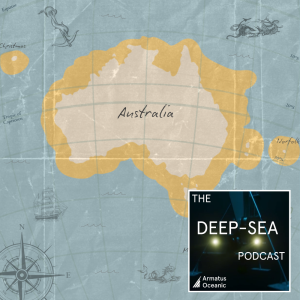
Saturday Oct 05, 2024
The great Australian deep with Todd Bond
Saturday Oct 05, 2024
Saturday Oct 05, 2024
With the professor momentarily pinned down in Perth, we thought it would be the ideal moment for him to talk to us all about his local waters, the great Australian deep sea.
Did you know that 70% of Australian waters are deeper than 1000m? Now that’s a lot of deep sea! We hear from the Minderoo-UWA Deep Sea Research Centre’s deputy director, Dr Todd Bond about the huge array of marine geographical features and biodiversity in Australia’s waters. Plus, Alan clears up some ongoing Australian-isms that have left him confused.
We also check in with our resident squid expert - Dr Kat Bolstad after the highly anticipated Squidtember comes to a close. Did you vote for your favourite squid, and if so, how did they score? We reckon Alan’s recent videos from the Tonga Trench (that he teased last episode) might’ve had a subtle influence…
Thanks again for tuning in, we’ll deep-see you next time!
------------------------------------------------------------------
Support us by becoming a patron and joining our deep-sea community!
We want to say a huge thank you to those patrons who have already pledged to support us:
Gaelle | Bharathy Singaravel
------------------------------------------------------------------
Feel free to get in touch with us with questions or your own comments on:
podcast@armatusoceanic.com
Read the show notes and find out more about us at:
www.armatusoceanic.com
------------------------------------------------------------------
Further resources
NEWS/Articles mentioned
Antibiotics from deep-sea microbes
New remote sensing technology allows for detailed measurements of deep-sea environments
New chimaera just dropped
100 million year old microbes found 75 m below the seabed are still alive
Biotwang mystery solved
Octopoteuthis - Same sex spermatangea implantation
Ceph Ref - Demo site & GoFundMe
‘Puppet’ squid Grimalditeuthis - Article and MBARI video
People mentioned
Kat Bolstad - Head of AUT Squid Squad lab in Aukland, New Zealand
Sarah McAnulty - Squid biologist, science communicator & purveyor of squid facts
Meg Mindlin - Cephalopod biologist, illustrator, photographer & science communicator
Ryan Howard - Cephalopod vision, AUT Squid Squad
Todd Bond - Deep-sea ecologist & Deputy Director of the Minderoo-UWA Deep-Sea Research Centre
Andrew Stewart - Curator of Fishes at Te Papa Museum, New Zealand
Song of the month
Charlie the Unicorn - In the ocean blue
Youtube & Spotify
------------------------------------------------------------------
Credits
Theme – Hadal Zone Express by Märvel
Logo image - The Deep-Sea Podcast
Edited by - Georgia Wells
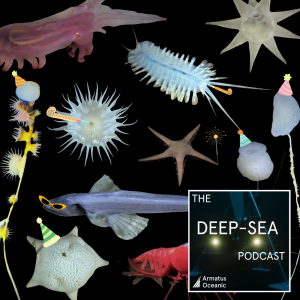
Saturday Sep 14, 2024
Tonga trench special
Saturday Sep 14, 2024
Saturday Sep 14, 2024
We made it to episode 50 and managed to pin down the professor to tell us all about his adventures offshore in the world’s second deepest point: the Tonga trench.
Expect to hear all about how the colossal deep-sea expedition is going, including the time Alan piloted a submarine to 2000m, stumbled upon a rarely seen deep-sea squid, and made poor Steve’s life difficult (the onboard media guy). Life on land is also just as chaotic as Alan has been jetsetting all over the world, with his shiny new OBE medal safely tucked in his backpack pocket, plus a very mysterious scroll from the king arrived and is now living proudly in his downstairs loo.
For those who really love the show, Alan shared with us pictures of all the species he found in the Tonga trench, and this extended video version of the episode is available now via our Patreon (and will be made publicly available on September 20th).
Thanks again for tuning in, we’ll deep-see you next time!
------------------------------------------------------------------
Support us by becoming a patron and joining our deep-sea community!
We want to say a huge thank you to those patrons who have already pledged to support us!
------------------------------------------------------------------
NEW MERCH DESIGNS
Check out our podcast merch here! Which still includes Alan’s beloved apron.
------------------------------------------------------------------
GET IN TOUCH
Email: podcast@armatusoceanic.com
Twitter: @DeepSeaPod, @ArmatusO
Facebook: DeepSeaPodcast, ArmatusOceanic
Instagram: @deepsea_podcast, @armatusoceanic
Keep up with the team on social media
Twitter:
Alan - @Hadalbloke
Thom - @ThomLinley
Georgia - @geeinthesea
Instagram:
Georgia - @geeinthesea
Thom - @thom.linley
Read the show notes and find out more about us at:
www.armatusoceanic.com
-----------------------------------------------------------------
Credits
Theme – Hadal Zone Express by Märvel
Logo image - Images courtesy of Alan Jamieson/UWA Deep Sea Research Centre/Inkfish
Edited by - Georgia Wells
#deepsea #deepocean #tongatrench #hadal #hadalresearch #offshore #podcast #science #marinebiology #alanjamieson #thomaslinley #interview #scicomm
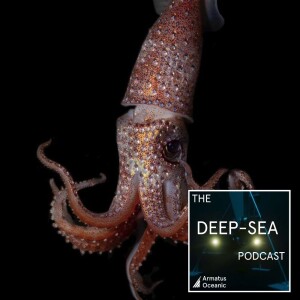
Saturday Sep 07, 2024
Squidtember with Kat Bolstad
Saturday Sep 07, 2024
Saturday Sep 07, 2024
As it turns out, returning to life on land after a mega deep-sea expedition takes a lot of work! So, whilst we aren't quite ready to share with you our Tonga Trench special, here is a mini-episode to keep you busy until we get back to you with episode 50.
We're talking all about SQUIDTEMBER with long-time friend of the show, Kat Bolstad from the AUT Squid Squad. Which squid will reign supreme come the end of the month? It's up to you to decide! You can find the links to vote, plus all of the other festivities here on the AUT Twitter page.
Thom and Kat also tell us a little about their latest project... attempting to flirt with deep-sea squid. Light-up paddles are involved.
Thanks so much for bearing with us whilst we get episode 50 together for you, we can't wait for you to hear it soon!
Thanks again for tuning in, we’ll deep-see you next time!
------------------------------------------------------------------
Support us by becoming a patron and joining our deep-sea community!
We want to say a huge thank you to those patrons who have already pledged to support us!
------------------------------------------------------------------
NEW MERCH DESIGNS
Check out our podcast merch here! Which still includes Alan’s beloved apron.
------------------------------------------------------------------
GET IN TOUCH
Email: podcast@armatusoceanic.com
Twitter: @DeepSeaPod, @ArmatusO
Facebook: DeepSeaPodcast, ArmatusOceanic
Instagram: @deepsea_podcast, @armatusoceanic
Keep up with the team on social media
Twitter:
Alan - @Hadalbloke
Thom - @ThomLinley
Georgia - @geeinthesea
Instagram:
Georgia - @geeinthesea
Thom - @thom.linley
Read the show notes and find out more about us at:
www.armatusoceanic.com
------------------------------------------------------------------
People/labs mentioned
Kat Bolstad - Head of AUT Squid Squad
AUT Lab for Cephalopod Ecology and Systematics
Sarah McAnulty - Squid biologist and Science communicator
Credits
Theme – Hadal Zone Express by Märvel
Logo image - NOAA
Edited by - Georgia Wells
#deepsea #deepocean #squidtember #squid #AUT #newzealand #colossalsquid #podcast #science #marinebiology #alanjamieson #thomaslinley #katbolstad #magnapinna #giantsquid #interview #scicomm
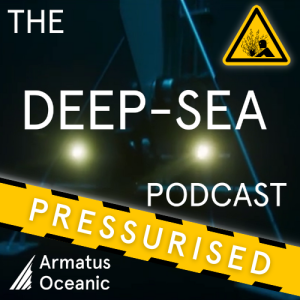
Saturday Aug 10, 2024
PRESSURISED: 049 - Chimaeras with Brit Finucci
Saturday Aug 10, 2024
Saturday Aug 10, 2024
Our short and to the point PRESSURISED version of episode 49. If you don't have time for the full episode and want to get right to the science without any of our waffle, this is the place to be!
Read the show notes and find the full episode here:
https://www.armatusoceanic.com/podcast/049-chimaera
To finish off our cartilaginous fish mini-series, we’re getting into our personal favourite: the chimera.
These little oddballs are closely related to sharks and rays but often go unmentioned. They are full of intriguing quirks, from lacking a stomach to possessing a reproductive appendage on their head! We speak with Dr Brit Finucci from NIWA, a lover of deep water sharks and champion kicker of heads (she is also a competitive Muay Thai fighter) all about these fascinating fishes and why they are so interesting.
Thanks again for tuning in, we’ll deep-see you next time!
------------------------------------------------------------------
Support us by becoming a patron and joining our deep-sea community!
We want to say a huge thank you to those patrons who have already pledged to support us:
Monty Priede | Audrey Gathright
------------------------------------------------------------------
NEW MERCH DESIGNS
Check out our podcast merch here! Which still includes Alan’s beloved apron.
------------------------------------------------------------------
GET IN TOUCH
Email: podcast@armatusoceanic.com
Twitter: @DeepSeaPod, @ArmatusO
Facebook: DeepSeaPodcast, ArmatusOceanic
Instagram: @deepsea_podcast, @armatusoceanic
Keep up with the team on social media
Twitter:
Alan - @Hadalbloke
Thom - @ThomLinley
Georgia - @geeinthesea
Instagram:
Georgia - @geeinthesea
Thom - @thom.linley
Read the show notes and find out more about us at:
www.armatusoceanic.com
------------------------------------------------------------------
FURTHER RESOURCES
Resources
Fishing for oil and meat drives irreversible defaunation of deepwater sharks and rays
Seals predating on Chimaera
Brit Finucci - Fisheries scientist at NIWA, New Zealand
Credits
Theme – Hadal Zone Express by Märvel
Logo image - The Deep-Sea Podcast: PRESSURISED Logo
Edited by - Georgia Wells
#deepsea #deepocean #chimera #chimaera #ghostshark #rabbitfish #shark #podcast #science #marinebiology #alanjamieson #thomaslinley #britfinucci #sharkweek #NIWA #interview #scicomm
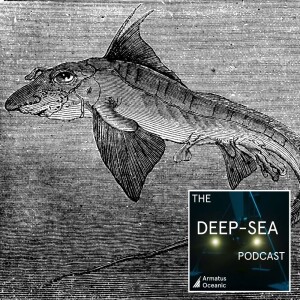
Saturday Aug 03, 2024
Chimaeras with Brit Finucci
Saturday Aug 03, 2024
Saturday Aug 03, 2024
To finish off our cartilaginous fish mini-series, we’re getting into our personal favourite: the chimera.
These little oddballs are closely related to sharks and rays but often go unmentioned. They are full of intriguing quirks, from lacking a stomach to possessing a reproductive appendage on their head! We speak with Dr Brit Finucci from NIWA, a lover of deep water sharks and champion kicker of heads (she is also a competitive Muay Thai fighter) all about these fascinating fishes and why they are so interesting.
We also speak with Leo Richards from Natural World Facts about his journey into making deep sea documentaries. If you have ever searched for deep-sea videos online, then you will have definitely come across Leo’s content, as his captivating way of sharing the deep-sea has reached millions of people.
Talking about high-quality content, The Professor has been joined offshore by a team of filmmakers, ready to capture the latest in hadal research. So expect some highly professional footage to come out in the next few weeks!
Finally, Andrew talks us through some physical features of the Chimera, including its pretty hefty defensive spine and some gnarly stories about things getting impaled.
Thanks again for tuning in, we’ll deep-see you next time!
------------------------------------------------------------------
Support us by becoming a patron and joining our deep-sea community!
We want to say a huge thank you to those patrons who have already pledged to support us:
Monty Priede | Audrey Gathright
------------------------------------------------------------------
NEW MERCH DESIGNS
Check out our podcast merch here! Which still includes Alan’s beloved apron.
------------------------------------------------------------------
GET IN TOUCH
Email: podcast@armatusoceanic.com
Twitter: @DeepSeaPod, @ArmatusO
Facebook: DeepSeaPodcast, ArmatusOceanic
Instagram: @deepsea_podcast, @armatusoceanic
Keep up with the team on social media
Twitter:
Alan - @Hadalbloke
Thom - @ThomLinley
Georgia - @geeinthesea
Instagram:
Georgia - @geeinthesea
Thom - @thom.linley
Read the show notes and find out more about us at:
www.armatusoceanic.com
------------------------------------------------------------------
FURTHER RESOURCES
NEWS
Spade-tooth whale washed up
Earliest shipwreck found
Submarine canyons in Australia
Gold below the seabed
Dark oxygen discovered
Fishing for oil and meat drives irreversible defaunation of deepwater sharks and rays
Seals predating on Chimaera
People mentioned
Brit Finucci - Fisheries scientist at NIWA, New Zealand
Leo Richards - Founder of Natural World Facts
Andrew Stewart - Curator of Fishes at Te Papa Museum, New Zealand
Isabella Liu - Illustrator inspired by the ocean
Meghan Jones - Artist inspired by the deep sea
Credits
Theme – Hadal Zone Express by Märvel
Logo image - Beauties and Wonders of Land and Sea (Published 1895)
Edited by - Georgia Wells
#deepsea #deepocean #chimera #chimaera #ghostshark #rabbitfish #shark #podcast #science #marinebiology #alanjamieson #thomaslinley #britfinucci #sharkweek #NIWA #interview #scicomm

Saturday Jul 13, 2024
PRESSURISED: 048 - Deep-sea sharks with Justin Cordova
Saturday Jul 13, 2024
Saturday Jul 13, 2024
Our short and to the point PRESSURISED version of episode 48. If you don't have time for the full episode and want to get right to the science without any of our waffle, this is the place to be!
Read the show notes and find the full episode here:
https://www.armatusoceanic.com/podcast/048-sharks
We’re back on the elasmobranch train with our latest episode all about deep-sea sharks!
We speak with Justin Cordova, co-founder and deputy director of The Rogue Shark Lab all about the fascinating world of deep-sea sharks! What makes them different from their shallow-water relatives? Why do their eyes glow green? How exactly do you get into a career in deep-sea shark research?
Thanks again for tuning in, we’ll deep-see you next time!
------------------------------------------------------------------
Support us by becoming a patron and joining our deep-sea community!
------------------------------------------------------------------
NEW MERCH DESIGNS
Check out our podcast merch here! Which still includes Alan’s beloved apron.
------------------------------------------------------------------
GET IN TOUCH
Email: podcast@armatusoceanic.com
Twitter: @DeepSeaPod, @ArmatusO
Facebook: DeepSeaPodcast, ArmatusOceanic
Instagram: @deepsea_podcast, @armatusoceanic
Read the show notes and find out more about us at:
www.armatusoceanic.com
------------------------------------------------------------------
FURTHER RESOURCES
People mentioned
Justin Cordova - Co-founder of The Rogue Shark Lab
Credits
Theme – Hadal Zone Express by Märvel
Logo image - PRESSURISED Logo
Edited by - Georgia Wells
#deepsea #deepocean #shark #podcast #science #marinebiology #alanjamieson #thomaslinley #justincordova #sharkweek #megalodon #goblinshark #interview #scicomm
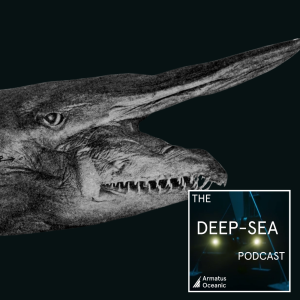
Saturday Jul 06, 2024
Deep-sea sharks with Justin Cordova
Saturday Jul 06, 2024
Saturday Jul 06, 2024
We’re back on the elasmobranch train with our latest episode all about deep-sea sharks!
We speak with Justin Cordova, co-founder and deputy director of The Rogue Shark Lab all about the fascinating world of deep-sea sharks! What makes them different from their shallow-water relatives? Why do their eyes glow green? How exactly do you get into a career in deep-sea shark research?
The Professor is trapped in paradise (somewhere in Fiji) whilst he quarantines before his next big offshore expedition. But he’s not alone - alongside his new pal Roger (the guard gecko) he's quarantining with deep-sea celebrity, Jason 'J-Rod' Rodriguez. The famed SuBastian ROV pilot is joining Alan on this next leg of the expedition to the Tonga Trench. Make sure you're following us to hear all of the updates in our next episode!
Andrew is back from his travels and was just as excited about our Lake Baikal episode as us! In this month's Coffee with Andrew segment, he talks us through the unbelievable similarities between deep-ocean and the deep-lake fish of Baikal.
Thanks again for tuning in, we’ll deep-see you next time!
------------------------------------------------------------------
Support us by becoming a patron and joining our deep-sea community!
We want to say a huge thank you to those patrons who have already pledged to support us:
Claudio Zanette | Becca Nicholls | Rebecca Rulnick
------------------------------------------------------------------
NEW MERCH DESIGNS
Check out our podcast merch here! Which still includes Alan’s beloved apron.
------------------------------------------------------------------
GET IN TOUCH
Email: podcast@armatusoceanic.com
Twitter: @DeepSeaPod, @ArmatusO
Facebook: DeepSeaPodcast, ArmatusOceanic
Instagram: @deepsea_podcast, @armatusoceanic
Keep up with the team on social media
Twitter:
Alan - @Hadalbloke
Thom - @ThomLinley
Georgia - @geeinthesea
Instagram:
Georgia - @geeinthesea
Thom - @thom.linley
Read the show notes and find out more about us at:
www.armatusoceanic.com
------------------------------------------------------------------
FURTHER RESOURCES
NEWS
Study shows sexual parasitism helped anglerfish invade the deep sea
Biological Sunglasses in a Deep-Sea Squid: Pigment Migration in the Retina of Gonatus onyx
The huge new paper on the classification of ray-finned fishes (living and fossil)
People mentioned
Ryan Howard - AUT Squid Squad PhD Candidate
Kat Bolstad - AUT Squid Squad leader
AUT Squid Squad Website & Twitter
Andrew Stewart - Curator of Fishes at Te Papa Museum, New Zealand
Justin Cordova - Co-founder of The Rogue Shark Lab
Credits
Theme – Hadal Zone Express by Märvel
Logo image - AMNH
Edited by - Georgia Wells
#deepsea #deepocean #shark #podcast #science #marinebiology #alanjamieson #thomaslinley #justincordova #sharkweek #megalodon #goblinshark #interview #scicomm

Saturday Jun 29, 2024
PRESSURISED: 023 – Keeping deep-sea animals with The Monterey Bay Aquarium
Saturday Jun 29, 2024
Saturday Jun 29, 2024
Our short and to the point PRESSURISED version of episode 23. If you don't have time for the full episode and want to get right to the science without any of our waffle, this is the place to be!
Read the show notes and find the full episode here:
https://www.armatusoceanic.com/podcast/023-deep-aquaria
Can we safely bring deep-sea organisms to the surface and keep them alive? Certain species, such as the giant isopods and giant Japanese spider crabs have been kept in aquaria in the past but the number of animals we can maintain long-term is quite small. The Monterey Bay Aquarium’s new Into the Deep exhibition has succeeded in keeping animals never before put on public display, some are even new to science. Not only that, but they have even had some success in getting them to reproduce! Figuring out what conditions these animals need and observing them over long periods will allow us to learn huge amounts about animals we usually only get a glimpse of. We talk with aquarists Ellen Umeda and Michelle Kaiser and life-support engineer Brian Maurer about the years of work that went into keeping these animals and giving the public a very personal deep-sea experience.
Check out our podcast merch! Which now includes Alan’s beloved apron.
Feel free to get in touch with us with questions or you own tales from the high seas on:
podcast@armatusoceanic.com
We are also on
Twitter: @DeepSeaPod, @ArmatusO
Facebook: ArmatusOceanic
Instagram: @deepsea_podcast, @armatusoceanic
Links
Into the Deep:
Aquarium YouTube Channel
Online exhibition
Deep-sea adaptation story with video
Bioluminescence story with video
Animal information story
Exhibition development with life support diagram
Credits
Theme – Hadal Zone Express by Märvel
Logo image - The Deep-Sea Podcast PRESSURISED Logo
Edited by - Georgia Wells

Saturday Jun 15, 2024
PRESSURISED: 047 - The depths of Lake Baikal with Marianne Moore
Saturday Jun 15, 2024
Saturday Jun 15, 2024
Our short and to the point PRESSURISED version of episode 47. If you don't have time for the full episode and want to get right to the science without any of our waffle, this is the place to be!
Read the show notes and find the full episode here:
https://www.armatusoceanic.com/podcast/047-baikal
Located in southern Siberia and covered in thick ice for almost half of the year, the colossal Lake Baikal reaches depths of 1600m making it the oldest, and deepest lake in the world. With hydrothermal vents, methane seeps and vast swathes of endemic species, this ancient lake was too tempting not to talk about.
We speak with Professor Marianne Moore, a Limnologist who has been working on the lake for over 2 decades. She guides us through its incredible ecosystems and species such as the world's only freshwater seal, deep water insects and foot-long flatworms!
We’re really trying to make this project self-sustaining so we have started looking for ways to support the podcast. Here’s a link to our page on how to support us, from the free options to becoming a patron of the show. We want to say a huge thank you to those patrons who have already pledged to support us!
Thanks again for tuning in, we’ll deep-see you next time!
Check out our podcast merch here! Which now includes Alan’s beloved apron and a much anticipated new design...
Feel free to get in touch with us with questions or your own tales from the high seas on:
podcast@armatusoceanic.com
We’d love to actually play your voice so feel free to record a short audio note!
We are also on
Twitter: @DeepSeaPod, @ArmatusO
Facebook: DeepSeaPodcast, ArmatusOceanic
Instagram: @deepsea_podcast, @armatusoceanic
Keep up with the team on social media
Twitter:
Alan - @Hadalbloke (https://twitter.com/Hadalbloke)
Thom - @ThomLinley (https://twitter.com/ThomLinley)
Georgia - @geeinthesea (https://twitter.com/geeinthesea)
Instagram:
Georgia - @geeinthesea
Thom - @thom.linley
Read the show notes and find out more about us at:
www.armatusoceanic.com
FURTHER RESOURCES
LAKE BAIKAL READING
Intro to Lake Baikal and lakes:
Mogolov, L.S. 2017. The Soul of Siberia at Risk. Wellesley Magazine. p.16-22.
Moore, M.V., S.E. Hampton, L.R. Izmest’eva, E.A. Silow, E.V. Peshkova, and B. Pavlov. 2009. Climate change and the world’s ‘Sacred Sea’ – Lake Baikal, Siberia. BioScience 59:405-417
Thomson, P. 2007. Sacred Sea: A Journey to Lake Baikal, Oxford University Press. 320 p.
Vincent, W.F. 2018. Lakes. A Very Short Introduction, Oxford University Press. 146 p.
Vents and seeps:
Crane, K., Hecker, B. and Golubev, V., 1991. Hydrothermal vents in Lake Baikal. Nature, 350(6316), pp.281-281.
Zemskaya, T.I., Sitnikova, T.Y., Kiyashko, S.I., Kalmychkov, G.V., Pogodaeva, T.V., Mekhanikova, I.V., Naumova, T.V., Shubenkova, O.V., Chernitsina, S.M., Kotsar, O.V. and Chernyaev, E.S., 2012. Faunal communities at sites of gas-and oil- bearing fluids in Lake Baikal. Geo-Marine Letters, 32, pp.437-451.
Fish:
Sideleva, V.G. 2003. The Endemic Fishes of Lake Baikal. Backhuys Publishers.
Sideleva, V.G. 2004. Mysterious Fish of Lake Baikal. Science First Hand 3:N2. (Note: ‘black umber’ and ‘white umber’, mentioned in this article, are two endemic varieties of the Siberian grayling Thymallus arcticus.)
Sideleva, V.G., 2016. Communities of the cottoid fish (Cottoidei) in the areas of hydrothermal vents and cold seeps of the abyssal zone of Baikal Lake. Journal of Ichthyology, 56, pp.694-701.
Seal:
Nomokonova, T., Losey, R.J., Iakunaeva, V.N., Emelianova, I.A., Baginova, E.A. and Pastukhov, M.V., 2013. People and seals at Siberia’s Lake Baikal. Journal of Ethnobiology, 33(2), pp.259-280.
Watanabe, Y.Y., Baranov, E.A. and Miyazaki, N., 2020. Ultrahigh foraging rates of Baikal seals make tiny endemic amphipods profitable in Lake Baikal. Proceedings of the National Academy of Sciences, 117(49), pp.31242-31248.
Environmental threats:
Moore, M.V., S.E. Hampton, L.R. Izmest’eva, E.A. Silow, E.V. Peshkova, and B. Pavlov. 2009. Climate change and the world’s ‘Sacred Sea’ – Lake Baikal, Siberia. BioScience 59:405-417.
Timoshkin, O.A. 2015. Ecological Crisis on Lake Baikal: Diagnosed by Scientists. Science First Hand 41:N2.
Timoshkin, O.A., D.P. Samsonov, M. Yamamuro, M.V. Moore, O.I. Belykh, V.V. Malnik, M.V. Sakirko, A.A. Shirokaya, N.A. Bondarenko, V.M. Domysheva, G.A. Fedorova, A.I. Kochetkov, et al. 2016. Rapid ecological change in the coastal zone of Lake Baikal (East Siberia): Is the site of the world’s greatest freshwater biodiversity in danger? Journal of Great Lakes Research 42:487-497. doi: 10.1016/j.jglr.2016.02.011
PEOPLE MENTIONED
Professor Marianne Moore & Marianne’s excellent paper on interdisciplinary work
CREDITS
Theme – Hadal Zone Express by Märvel
Edited by - Georgia Wells
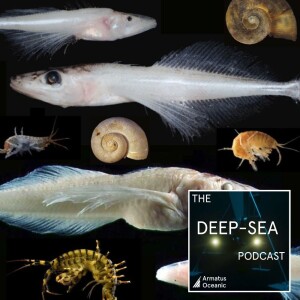
Saturday Jun 08, 2024
The depths of Lake Baikal with Marianne Moore
Saturday Jun 08, 2024
Saturday Jun 08, 2024
Located in southern Siberia and covered in thick ice for almost half of the year, the colossal Lake Baikal reaches depths of 1600m making it the oldest, and deepest lake in the world. With hydrothermal vents, methane seeps and vast swathes of endemic species, this ancient lake was too tempting not to talk about.
We speak with Professor Marianne Moore, a Limnologist who has been working on the lake for over 2 decades. She guides us through its incredible ecosystems and species such as the world's only freshwater seal, deep water insects and foot-long flatworms! Plus, we hear about the myths and mysteries of the lake: from scientifically testing whether the mafia can use amphipods to effectively dispose of bodies, to whether there really is 1600 tonnes of gold hiding at the bottom of the lake.
The Professor is back on land after a succession of crazy adventures which includes writing a paper on backwards swimming in deep sea fish, finding the worlds deepest nudibranch (possibly) plus discovering his friends live in the most metal place ever.
There’s no Coffee with Andrew segment this month as he is taking a well deserved break (and is possibly touring the country looking for the strangest milks he can find), but we do hear from Kakani Kajita about the recent release of FathomVerse - the mobile game helping to contribute to deep sea citizen science. Kakani tells us about how it’s doing in its first month of release, and how it’s already making an impact in training deep sea AI models.
We’re really trying to make this project self-sustaining so we have started looking for ways to support the podcast. Here’s a link to our page on how to support us, from the free options to becoming a patron of the show. We want to say a huge thank you to those patrons who have already pledged to support us:
Elinor Wahl | Andrew Stewart | KJ Quintanilla | Thomas Brattheim
Thanks again for tuning in, we’ll deep-see you next time!
Check out our podcast merch here! Which now includes Alan’s beloved apron and a much anticipated new design...
Feel free to get in touch with us with questions or your own tales from the high seas on:
podcast@armatusoceanic.com
We’d love to actually play your voice so feel free to record a short audio note!
We are also on
Twitter: @DeepSeaPod, @ArmatusO
Facebook: DeepSeaPodcast, ArmatusOceanic
Instagram: @deepsea_podcast, @armatusoceanic
Keep up with the team on social media
Twitter:
Alan - @Hadalbloke (https://twitter.com/Hadalbloke)
Thom - @ThomLinley (https://twitter.com/ThomLinley)
Georgia - @geeinthesea (https://twitter.com/geeinthesea)
Instagram:
Georgia - @geeinthesea
Thom - @thom.linley
Read the show notes and find out more about us at:
www.armatusoceanic.com
FURTHER RESOURCES
Triton submarines are building a new submarine to visit the Titanic to show that deep sea exploration is safe
Robotic Explorers Uncover Unexpected Ancient Origins of Strange Seafloor Formations
Deep-sea sponge's 'zero-energy' flow control could inspire new energy efficient designs
LAKE BAIKAL READING
Intro to Lake Baikal and lakes:
Mogolov, L.S. 2017. The Soul of Siberia at Risk. Wellesley Magazine. p.16-22.
Moore, M.V., S.E. Hampton, L.R. Izmest’eva, E.A. Silow, E.V. Peshkova, and B. Pavlov. 2009. Climate change and the world’s ‘Sacred Sea’ – Lake Baikal, Siberia. BioScience 59:405-417
Thomson, P. 2007. Sacred Sea: A Journey to Lake Baikal, Oxford University Press. 320 p.
Vincent, W.F. 2018. Lakes. A Very Short Introduction, Oxford University Press. 146 p.
Vents and seeps:
Crane, K., Hecker, B. and Golubev, V., 1991. Hydrothermal vents in Lake Baikal. Nature, 350(6316), pp.281-281.
Zemskaya, T.I., Sitnikova, T.Y., Kiyashko, S.I., Kalmychkov, G.V., Pogodaeva, T.V., Mekhanikova, I.V., Naumova, T.V., Shubenkova, O.V., Chernitsina, S.M., Kotsar, O.V. and Chernyaev, E.S., 2012. Faunal communities at sites of gas-and oil- bearing fluids in Lake Baikal. Geo-Marine Letters, 32, pp.437-451.
Fish:
Sideleva, V.G. 2003. The Endemic Fishes of Lake Baikal. Backhuys Publishers.
Sideleva, V.G. 2004. Mysterious Fish of Lake Baikal. Science First Hand 3:N2. (Note: ‘black umber’ and ‘white umber’, mentioned in this article, are two endemic varieties of the Siberian grayling Thymallus arcticus.)
Sideleva, V.G., 2016. Communities of the cottoid fish (Cottoidei) in the areas of hydrothermal vents and cold seeps of the abyssal zone of Baikal Lake. Journal of Ichthyology, 56, pp.694-701.
Seal:
Nomokonova, T., Losey, R.J., Iakunaeva, V.N., Emelianova, I.A., Baginova, E.A. and Pastukhov, M.V., 2013. People and seals at Siberia’s Lake Baikal. Journal of Ethnobiology, 33(2), pp.259-280.
Watanabe, Y.Y., Baranov, E.A. and Miyazaki, N., 2020. Ultrahigh foraging rates of Baikal seals make tiny endemic amphipods profitable in Lake Baikal. Proceedings of the National Academy of Sciences, 117(49), pp.31242-31248.
Environmental threats:
Moore, M.V., S.E. Hampton, L.R. Izmest’eva, E.A. Silow, E.V. Peshkova, and B. Pavlov. 2009. Climate change and the world’s ‘Sacred Sea’ – Lake Baikal, Siberia. BioScience 59:405-417.
Timoshkin, O.A. 2015. Ecological Crisis on Lake Baikal: Diagnosed by Scientists. Science First Hand 41:N2.
Timoshkin, O.A., D.P. Samsonov, M. Yamamuro, M.V. Moore, O.I. Belykh, V.V. Malnik, M.V. Sakirko, A.A. Shirokaya, N.A. Bondarenko, V.M. Domysheva, G.A. Fedorova, A.I. Kochetkov, et al. 2016. Rapid ecological change in the coastal zone of Lake Baikal (East Siberia): Is the site of the world’s greatest freshwater biodiversity in danger? Journal of Great Lakes Research 42:487-497. doi: 10.1016/j.jglr.2016.02.011
PEOPLE MENTIONED
Professor Marianne Moore & Marianne’s excellent paper on interdisciplinary work
Kakani Kajita
SOUNDTRACK OF THE MONTH
Frightening Fishes
CREDITS
Theme – Hadal Zone Express by Märvel
Logo image - Vereshchagina et al (2021), Sitnikova et al (2018), Teterina et al (2010)
Edited by - Georgia Wells

Saturday May 25, 2024
PRESSURISED: 022 - Live-streaming the deep with Kasey Cantwell
Saturday May 25, 2024
Saturday May 25, 2024
Our short and to the point PRESSURISED version of episode 22. If you don't have time for the full episode and want to get right to the science without any of our waffle, this is the place to be!
Read the show notes and find the full episode here:
https://www.armatusoceanic.com/podcast/022-dive-streaming
One of the most exciting parts of our job is going to places that no one has ever been before and seeing things that no one has ever seen. It turns out, we were making that far harder than it needs to be, we can do all this from home! Several of the big names in deep-sea exploration live-stream (or dive-stream if we’re being cute). With just a few seconds delay, you can see deep-sea exploration as it happens and may be present for very significant finds. You never know what you’re going to find down there.
The big players in this space are the Schmidt Ocean Institute, Nautilus Live from the Ocean Exploration Trust and Ocean Exploration/Okeanos Explorer from NOAA. We are lucky enough to chat with Kasey Cantwell, the Operations Chief of the NOAA Ocean Exploration Expeditions and Exploration Division. We talk about the amazing opportunities this new way of doing science presents. From allowing 300 experts to take part, to swapping out your expert team when you find something unexpected and even the physical and societal barriers that can be removed. But it’s not just about getting science done, it’s about sharing these experiences with everyone. Online communities are forming around these streams and illustrations, poetry and memes are just as valid outputs.
Check out our podcast merch! Please do send in any pics of you wearing the merch. We find the idea of real people in the actual world wearing this so surreal!
Feel free to get in touch with us with questions or you own tales from the high seas on:
podcast@armatusoceanic.com
We are also on
Twitter: @ArmatusO
Facebook: ArmatusOceanic
Instagram: @armatusoceanic
Read the show notes and find out more about us at:
www.armatusoceanic.com
Glossary
AUV – Autonomous Underwater Vehicle
Berth – Beds available onboard a ship basically
Manganese nodule – potato shaped balls of metal that form on the seabed, the focus of deep-sea mining
ROV – Remotely Operated Vehicle
Taxonomist – A specialist in categorising a specific group of species.
Telepresence – Live-streaming what you’re doing on the internet
Links
Start dive-streaming yourself!
NOAA Ocean Exploration
Schmidt Ocean Institute
Nautilus Live
Become part of the online community!
Livestream Oceanographic Discord
Look out for expedition names as hashtags on Twitter
Credits
Theme – Hadal Zone Express by Märvel
Logo image - The Deep-Sea Podcast PRESSURISED Logo

Saturday May 11, 2024
PRESSURISED: 046 - Deep sea rays & skates with Will White
Saturday May 11, 2024
Saturday May 11, 2024
Our short and to the point PRESSURISED version of episode 46. If you don't have time for the full episode and want to get right to the science without any of our waffle, this is the place to be!
Read the show notes and find the full episode here:
https://www.armatusoceanic.com/podcast/046-rays
This month we're talking about the flattest of the elasmobranchs: the bottom-dwelling batoids - the deep sea rays and skates!
We’re kicking off our cartilaginous fishes (Chondrichthyes) mini-series with the batoids - the rays and skates! Sharks are often associated with the deep sea, but did you know that batoids have been observed as deep as 3000m?
We speak with Will White who researches elasmobranchs across the world and who has described 50 species! He talks us through the differences between sharks rays and skates, and how these species utilise the deep sea. We hear about their fascinating (and hugely varied) reproductive strategies like those that are viviparous (will keep the eggs in their uterus) and others that are oviparous (will lay the eggs).
We’re really trying to make this project self-sustaining so we have started looking for ways to support the podcast. Here’s a link to our page on how to support us, from the free options to becoming a patron of the show.
Thanks again for tuning in, we’ll deep-see you next time!
Check out our podcast merch here! Which now includes Alan’s beloved apron and a much anticipated new design...
Feel free to get in touch with us with questions or your own tales from the high seas on:
podcast@armatusoceanic.com
We’d love to actually play your voice so feel free to record a short audio note!
We are also on
Twitter: @DeepSeaPod, @ArmatusO
Facebook: DeepSeaPodcast, ArmatusOceanic
Instagram: @deepsea_podcast, @armatusoceanic
Keep up with the team on social media
Twitter:
Alan - @Hadalbloke (https://twitter.com/Hadalbloke)
Thom - @ThomLinley (https://twitter.com/ThomLinley)
Georgia - @geeinthesea (https://twitter.com/geeinthesea)
Instagram:
Georgia - @geeinthesea (https://www.instagram.com/geeinthesea/)
Read the show notes and find out more about us at:
www.armatusoceanic.com
Links
More info on Will and his research
Will’s recent article on a new family of deepwater sharks
Great eggcase hunt - Sharks Trust
Credits
Theme – Hadal Zone Express by Märvel
Logo Image - The Deep-Sea Podcast PRESSURISED Logo
Edited by - Georgia Wells

Saturday May 04, 2024
Deep sea rays & skates with Will White
Saturday May 04, 2024
Saturday May 04, 2024
This month we're talking about the flattest of the elasmobranchs: the bottom-dwelling batoids - the deep sea rays and skates!
We’re kicking off our cartilaginous fishes (Chondrichthyes) mini-series with the batoids - the rays and skates! Sharks are often associated with the deep sea, but did you know that batoids have been observed as deep as 3000m?
We speak with Will White who researches elasmobranchs across the world and who has described 50 species! He talks us through the differences between sharks rays and skates, and how these species utilise the deep sea. We hear about their fascinating (and hugely varied) reproductive strategies like those that are viviparous (will keep the eggs in their uterus) and others that are oviparous (will lay the eggs).
It wouldn’t be a Coffee with Andrew segment without a memorable insight into the world of a fish curator - and this month’s segment is no different! This time, Dr Thom asks Andrew about an unexpected factoid in one of Andrew’s publications: ‘Yolk smells and tastes like sweetened condensed milk’. We find out exactly how Andrew knows this.
We’re really trying to make this project self-sustaining so we have started looking for ways to support the podcast. Here’s a link to our page on how to support us, from the free options to becoming a patron of the show. We want to say a huge thank you to those patrons who have already pledged to support us:
Matthew Gerrard | Jeff Day | Colin Platt
Thanks again for tuning in, we’ll deep-see you next time!
Check out our podcast merch here! Which now includes Alan’s beloved apron and a much anticipated new design...
Feel free to get in touch with us with questions or your own tales from the high seas on:
podcast@armatusoceanic.com
We’d love to actually play your voice so feel free to record a short audio note!
We are also on
Twitter: @DeepSeaPod, @ArmatusO
Facebook: DeepSeaPodcast, ArmatusOceanic
Instagram: @deepsea_podcast, @armatusoceanic
Keep up with the team on social media
Twitter:
Alan - @Hadalbloke (https://twitter.com/Hadalbloke)
Thom - @ThomLinley (https://twitter.com/ThomLinley)
Georgia - @geeinthesea (https://twitter.com/geeinthesea)
Instagram:
Georgia - @geeinthesea (https://www.instagram.com/geeinthesea/)
Read the show notes and find out more about us at:
www.armatusoceanic.com
Links
Moku Art Studio virtual exhibition
Thom appears on Radio New Zealand
Blog-style articles of our interviews
Here's a nice paper with a few observations of elasmobranch food falls
New parasite just dropped!
New shark family!
Bioluminescence 300 millions years older than previously thought
Fathomverse is now live!
More info on Will and his research
Will’s recent article on a new family of deepwater sharks
Great eggcase hunt - Sharks Trust
Andrew’s book mentioned in Coffee with Andrew
Credits
Theme – Hadal Zone Express by Märvel
Logo Image - Matthias Stehmann et al. (2021)
Edited by - Georgia Wells

Saturday Apr 27, 2024
PRESSURISED: 021 - Deep sea images and AI with Kakani Katija
Saturday Apr 27, 2024
Saturday Apr 27, 2024
Our short and to the point PRESSURISED version of episode 21. If you don't have time for the full episode and want to get right to the science without any of our waffle, this is the place to be!
Read the show notes and find the full episode here:
https://www.armatusoceanic.com/podcast/021-ai
We have often talked about how difficult it is the get data from the deep sea… but would you believe that the bottleneck to our understanding of the deep ocean, at least as far as visual data, is processing those images? Turning a picture of the deep sea into a list of species, habitat type, sediment type etc. is a time-consuming process that requires a wide range of skilled people.
Due to time/funding constrains a lot of valuable information is lost. A team looking at a specific question will have lots of information in their data that other teams could use.
A picture is worth a thousand data points.
We chat with Dr Kakani Katija, the co-founder of FathomNet, an open-source repository for labelled deep-sea imaging data. The platform is still in beta but it is hoped that it will allow scientists to easily and usefully share their amassed data in a single and easily searchable place.
But what about that processing bottleneck? The tech-savvy listener may have noticed that a massive collection of labelled image data is exactly the sort of thing you need to train a Machine Learning or Deep Learning algorithm. Can we automate a lot of the time-consuming image processing and let the experts focus on the new and unusual stuff? It’s at this cutting edge that things get exciting and we may be at the cusp of a marine science renaissance.
We also launch our podcast merch! Please do send in any pics of you wearing the merch. We find the idea of real people in the actual world wearing this so surreal!
Feel free to get in touch with us with questions or you own tales from the high seas on:
podcast@armatusoceanic.com
We are also on
Twitter: @ArmatusO
Facebook: ArmatusOceanic
Instagram: @armatusoceanic
Read the show notes and find out more about us at:
www.armatusoceanic.com
Glossary
Artificial Intelligence (AI) – A science dedicated to making machines think in an intelligent way, mirroring a biological brain.
Data pipeline – A path that raw data follows to become useful information.
Deep Learning – a more complex subset of ML that mirrors the way a brain works
Machine Learning (ML) – computers learning to perform a task without being explicitly programmed to do so
ML/AI model or algorithm – A model that has been trained on real data and can now process new data itself.
Online Repository – A database stored online so that people can access it from anywhere
Open Source – A publicly accessible design that people can freely repurpose and adapt.
Visual data – photos or video as a form of scientific data
Links
Our new merch!
Kakani’s Twitter
FathomNet goodies
The FathomNet website – have an explore of the labelled deep-sea critter data
FathomNet GitHub – take a peek under the hood or even get involved
FathomNet articles with tutorials/explanations
Helpful video tutorials
Paper
NOAA Science Seminar, 8 March 2022 1200-1300 PST (UTC-8)
Register now!
FathomNet Workshop, 31 March & 1 April 2022 0800-1100 PST (UTC-8)
Register now!
Internet of Elephants (gamifying processing camera-trap data)
Beyond Blue (game)
Credits
Theme – Hadal Zone Express by Märvel
Logo image - PRESSURISED logo

Saturday Apr 13, 2024
PRESSURISED: 045 - Hagfish with Doug Fudge
Saturday Apr 13, 2024
Saturday Apr 13, 2024
Our short and to the point PRESSURISED version of episode 45. If you don't have time for the full episode and want to get right to the science without any of our waffle, this is the place to be!
Read the show notes and find the full episode here:
https://www.armatusoceanic.com/podcast/045-hagfish
What has no jaw, inverted horizontal teeth, saggy skin and can produce litres of suffocating slime when touched? it’s the episode you’ve been waiting for… The hagfish special is here.
Dr Thom is back from his stint offshore, and The Professor pretty much now lives in a submarine, but that hasn’t stopped them from finally reuniting to make this special episode all about hagfish. We’ve talked about them a lot on the show, and decided it’s time to pass them the mic. So expect lots of slimy stories, toothy tales and a whole load of hagfish trivia you never knew you needed.
There’s lots of updates after so many recent deep sea expeditions, with Thom’s latest cruise discovering many new species and Alan sharing live updates from the sub. Keep up with their latest goings-on via twitter!
We speak to the king of the hagfish, Professor Doug Fudge, who has been studying these critters and their (in)famous slime for decades. We ask all the interesting questions like: how do they make so much slime, do they have any predators and why do they look like that?
We’re really trying to make this project self-sustaining so we have started looking for ways to support the podcast. Here’s a link to our page on how to support us, from the free options to becoming a patron of the show.
Thanks again for tuning in, we’ll deep-see you next time!
Check out our podcast merch here! Which now includes Alan’s beloved apron and a much anticipated new design...
Feel free to get in touch with us with questions or your own tales from the high seas on:
podcast@armatusoceanic.com
We’d love to actually play your voice so feel free to record a short audio note!
We are also on
Twitter: @DeepSeaPod, @ArmatusO
Facebook: DeepSeaPodcast, ArmatusOceanic
Instagram: @deepsea_podcast, @armatusoceanic
Keep up with the team on social media
Twitter:
Alan - @Hadalbloke (https://twitter.com/Hadalbloke)
Thom - @ThomLinley (https://twitter.com/ThomLinley)
Georgia - @geeinthesea (https://twitter.com/geeinthesea)
Instagram:
Georgia - @geeinthesea (https://www.instagram.com/geeinthesea/)
Read the show notes and find out more about us at:
www.armatusoceanic.com
People mentioned:
The famous hagfish vs shark slime video
Moku Art Studio virtual exhibition
People mentioned
More info on Professor Douglas Fudge
Fudge’s research lab
Follow Doug on twitter
More info about Andrew Stewart
Dr Vincent Zintzen
Credits
Theme – Hadal Zone Express by Märvel
Logo image - PRESSURISED
Edited by - Georgia Wells
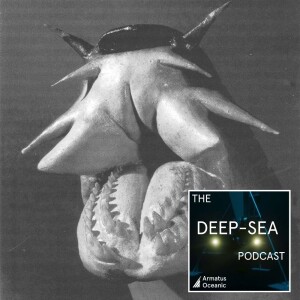
Saturday Apr 06, 2024
Hagfish with Doug Fudge
Saturday Apr 06, 2024
Saturday Apr 06, 2024
What has no jaw, inverted horizontal teeth, saggy skin and can produce litres of suffocating slime when touched? it’s the episode you’ve been waiting for… The hagfish special is here.
Dr Thom is back from his stint offshore, and The Professor pretty much now lives in a submarine, but that hasn’t stopped them from finally reuniting to make this special episode all about hagfish. We’ve talked about them a lot on the show, and decided it’s time to pass them the mic. So expect lots of slimy stories, toothy tales and a whole load of hagfish trivia you never knew you needed.
There’s lots of updates after so many recent deep sea expeditions, with Thom’s latest cruise discovering many new species and Alan sharing live updates from the sub. Keep up with their latest goings-on via twitter!
We speak to the king of the hagfish, Professor Doug Fudge, who has been studying these critters and their (in)famous slime for decades. We ask all the interesting questions like: how do they make so much slime, do they have any predators and why do they look like that?
Plus, we have another instalment of the fan-favourite: Coffee with Andrew. This time, Andrew talks us through his love of hagfish, how to successfully remove their slime, and why brushing their teeth is super important!
Thanks again for tuning in - we’ll be back soon with some cartilaginous-based episodes!
--------------------------------------
We’re really trying to make this project self-sustaining so we have started looking for ways to support the podcast. Here’s a link to our page on how to support us, from the free options to becoming a patron of the show. We want to say a huge thank you to those patrons who have already pledged to support us:
Shaun Thompson | Maarten van der Meer
Thanks again for tuning in, we’ll deep-see you next time!
DID YOU KNOW WE SELL MERCH?
Check it out here!! And please do send in any pics of you wearing the merch!
Feel free to get in touch with us with questions or your own comments on:
podcast@armatusoceanic.com
We’d love to actually play your voice so feel free to record a short audio note!
Follow us on social media!
Twitter: @DeepSeaPod, @ArmatusO
Facebook:DeepSeaPodcast, ArmatusOceanic
Instagram: @deepsea_podcast, @armatusoceanic
Keep up with the team on social media:
Twitter: Alan - @Hadalbloke, Thom - @ThomLinley, Georgia - @geeinthesea
Instagram: Thom - @Thom.Linley, Georgia - @geeinthesea
Read the show notes and find out more about us at:
www.armatusoceanic.com
Further resources
The famous hagfish vs shark slime video
Moku Art Studio virtual exhibition
Nazca ridge SOI cruise discovers 100 new species
NewYonder (Sign up here) or explore their catalogue
Don’t forget to use our discount code DEEPSEA20 and get 20% off your first three months of a UK monthly subscription
People mentioned
More info on Professor Douglas Fudge
Fudge’s research lab
Follow Doug on twitter
Follow Jeff on twitter
More info about Andrew Stewart
Dr Vincent Zintzen
Credits
Theme – Hadal Zone Express by Märvel
Logo image - AMNH
Edited by - Georgia Wells







